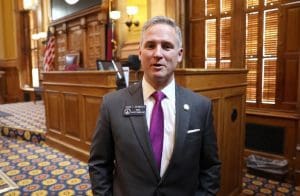Lawmakers protect fossil fuel industry while pretending it's for their constituents
State officials, who’ve received millions from fossil fuel companies, are intent on preempting natural gas bans with legislation of their own.

State lawmakers across the country are rolling out new legislation that effectively outlaws natural gas bans by cities and municipalities — even though such bans encourage the use of cost-effective and climate-friendly renewable energy in new building construction.
While some state Republicans are presenting these anti-gas-ban bills under the guise of concern for energy choice, experts say their underlying motivation is to prop up the fossil fuel industry.
Georgia’s state Senate voted 34-15 on Monday to pass Georgia House Bill 150, which would ban policies that prohibit home or business connections to infrastructure based on the type of fuel source delivered to the building, according to a report by the Georgia Recorder. In effect, this would prevent cities and municipalities from enacting natural gas bans.
The bill, which underwent slight changes in the Senate, according to the Georgia Recorder, now goes back to the state House for concurrence.
Related bills have cropped up in numerous other states in recent days, many of them sponsored or backed by Republican lawmakers.
A similar bill in Texas, House Bill 17, was advanced in mid-March by Democratic state Rep. Joe Deshotel. It’s been labeled as priority emergency response legislation after February’s winter storms ravaged much of Texas. Critics noted that prominent Republicans, such as Texas House Speaker Dade Phelan, support the measure.
On March 4, Republican lawmakers in North Carolina put forward House Bill 220, which also effectively outlaws cities from enacting gas bans. Its four main sponsors are Republicans.
And earlier in the month, Indiana lawmakers introduced House Bill 1191, which, according to the Indianapolis Star, buoys the natural gas industry, despite its neutral-sounding language. No city in the state has yet tried to ban natural gas.
Though in some cases preemptive, these bills are seen by critics as largely reactionary — a response to California cities and cities such as Seattle banning natural gas as a fuel source in certain newly constructed buildings, which experts say could cut emissions by as much as 90%, and carry a host of other health and economic benefits.
Georgia Republican state Sen. John Kennedy of Macon, who sponsored the Georgia bill, specifically noted these instances to justify the legislation.
“That’s really what this is aimed at and where this is headed,” he said.
Lawmakers also claim the legislation protects free choice of energy sources for consumers.
In a statement to the Texas House State Affairs Committee, sponsor Deshotel said, “The purpose of this bill is to prevent a city from prohibiting choice of fuel for homes.”
But some cities and municipalities see it as limiting their freedom and forcing them to retain connections with an outdated fossil fuel industry.
Savannah, Georgia’s Alderman Nick Palumbo slammed Georgia’s iteration of the bill as actually limiting energy choices for states and municipalities.
“It would preempt municipalities from being able to make those energy choices and force you to take energy, like coal or natural gas that maybe residents don’t want into the future,” he told the Savannah Morning News.
The Republican mayor of Carmel, Indiana, also opposes state legislation that effectively outlaws gas bans.
“These should be local decisions … It’s disappointing to see legislators who don’t understand that,” he told the Indianapolis Star. “[A ban on any fuel type] is not needed right now, but it limits flexibility in the future. And we don’t know what the future holds.”
Many experts say the legislation’s real intent is to support fossil fuels. As Indiana University economics policy professor, Sanya Carley, noted, speaking to the outlet, “It’s perhaps less to protect consumers, and more to restrict cities ability to take steps and make changes as it relates to climate change.”
Several of the lawmakers sponsoring North Carolina’s iteration of the bill have received extensive donations from the fossil fuel industry in the past. Arp, the chief sponsor and co-chair of the state House Energy Committee, received $38,500 from fossil-fuel-related portions of the energy sector, amounting to roughly 30% of his campaign contributions, and co-sponsor Szoka received $33,000 from energy interests — although not all were from fossil fuel industry and some were from groups promoting renewable energy.
In the wake of deadly winter storms in Texas, many noted that scores of state politicians, including Texas Gov. Greg Abbott, had also received substantial donations from the gas industry and other fossil fuel interests.
Long-term trends also indicate that the oil and gas industries disproportionately donate to Republican candidates, donating $62.2 million (83%) to Republican candidates in the 2020 election cycle and only $12.2 million to Democratic candidates.
Charlie Spatz, a researcher at the Climate Investigation Center, agreed that the Indiana bill was just a front for protecting fossil fuel interests, telling the Indianapolis Star, “This is what happens. They feel they are facing an existential threat and they’re not looking to change their business practices. So instead they have a strategy to tie the hands of municipalities who want to reduce fossil fuel use and take action on the climate crisis.”
Jennette Gayer, Environment Georgia’s executive director, said the gas industry is supporting candidates that will outlaw gas bans because they see “the writing on the wall.”
“Solar energy, renewable energies are becoming cheaper and cheaper and cheaper, and gas and gas is likely to become more expensive,” she told the Savannah Morning News. “And so they know they need to lock as many people in now to dirty gas infrastructure as they can.”
Published with permission of The American Independent Foundation.
Recommended

President Biden visits Prince William park to talk solar, youth involvement on Earth Day
Virginia set to receive $156 million from U.S. Environmental Protection Agency program
By Charlie Paullin, Virginia Mercury - April 23, 2024
Texas governor and attorney general do little to curb state’s chemical plant crisis
Republicans Greg Abbott and Ken Paxton have taken thousands of dollars in donations from chemical companies and their affiliated PACs.
By Jesse Valentine - December 08, 2023
‘We’ve been waiting for this’: Union workers cheer Biden’s hydrogen hub plan
Federal funding for the hub is estimated to bring over 20,000 jobs to the Pennsylvania-New Jersey-Delaware area.
By Anna Gustafson - October 17, 2023







































































